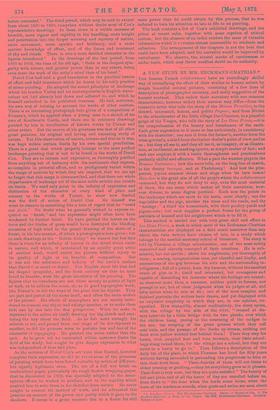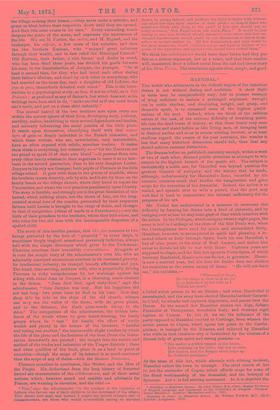A NEW STUDY BY MM. ERCKMANN-CHATRIAN.* THE famous French collaborateurs
have an exceedingly skilful way of intensifying the effect of their studies in human nature by simple beautiful natural pictures, consisting of a few lines of description of photographic accuracy, and easily suggestive of the keenest contrast. They endow their narrators with one common characteristic, however widely their natures may differ—from the romantic artist who tells the story of the Matson Forestiere, to the shrewd, interested, honest, and politic Paysan ; and from Michel to the schoolmaster of the little village Des Chaumes, in a peaceful gorge of the Vosges, who tells the story of Les Deux Freres,—it is the comprehension of the beauty and beneficence of the earth. Each gives expression to it more or less articulately, in consistency with his character ; one sees it from the farmer's, another from the wine-grower's, a third from the timber-dealer's point of view, and so on ; but they all see it, and they all use it, as imagery, or as illustra- tion, as incidental, as marking epochs, as simple matter of fact; and each one employs it with a rustic thoroughness and practicalness perfectly skilful and effective. What a part the weather plays in the Romans Nationaux ; how the snow tells, on the long line of march, in the dreary baroque, and at Phalabourg ! And how the pros- perous, joyous summer shines and sings when its turn comes! Bien-etre is the great aim of all the people whom the collaborateurs commend, but they do not deny to any, even the most material of them, the one sense which makes all their narratives, how- ever diverse, to some degree poetical. Each sees the points in the landscape which are most to his taste, most clearly; one the vegetables and the pigs, another the trees and the roads, and the " roulage ;" a third the homesteads, with their poultry-yards and pigeon-cots; but each supplies a perfeot frame for the group of portraits of himself and his neighbours which is to fill it.
This method is carried out with very great skill and effect in Les Deux Freres, a work in which most of the Erckmann-Chatrian characteristics are displayed on a field much narrower than any which the twin writers have chosen of late, in a study which belongs to the morbid-anatomy school of literature. The story is told by Florence, a village schoolmaster, one of the most subtly conceived and cleverly conveyed of their creations. He is sub- missive, but not servile ; above his neighbours, yet thoroughly of them ; a musing, companionless man, yet cheerful and kindly, and unconscious of the gap between his own and the surrounding in- telligences; full of a quaint, keen, dry humour, without the smallest touch of glee in it; timid and interested, but courageous and capable of discarding his interests where his feelings are roused ; an observer more than a reasoner, neither quick to foresee, nor prompt to act, but of clear judgment when he judges at all, and lofty action when he acts at all ; one of the most complex and finished portraits the writers have drawn, and yet displayed with an exquisite simplicity in which they are, in our opinion, un- equalled. How tranquilly, almost meditatively, the story opens,. with the village by the side of the river, "crossed at dis- tant intervals by a little bridge with its two planks, over which the children hang, gazing at the swarming of the midges in the sun, the swaying of the great grasses which they cal cats' tails, and the passage of the ducks up stream, striking out their wide yellow webbed feet behind them! There they stay for hours, with rumpled hair and torn trowsers, their liatle school- bags slung round them, for the village has a school, but they are never in a hurry to go in." Then follows a description of the daily life of the place, in which Florence has lived for fifty years without having succeeded in persuading the proprietors to trim or thin their fruit trees. "Three-fourths of them will not listen to either pruning or grafting,—they let everything grow as it pleases. Theirfruit is very sour, but they are quite satisfied." The beauty of hill and plain and of all the hours of day are unrolled before us, from dawn to "the time when the herds come home, when the horn of the herdsman sounds, when goats and swine are seen about • 1. Les Dux Freres. Par Erekmann-Chatrian Paris : J. Hetzel et Cie. 2. The Brothers Ran!zau: a Story of the Vosges. By KM. Erekmann-Chatrian. London Sampson Low.
the village seeking their homes ;—they never make a mistake, and grunt or bleat before their respective doors until they are opened. And then this noise ceases in its turn." Every succeeding touch deepens the peace of the scene, and expresses the narrowness of the life. We see M. Fortier, the maire, and M. Rigaud, and the innkeeper, his adjoint, a few more of the notables, and then the two brothers Rantzau, who "enjoyed great influence through their wealth, and in fact ruled the Municipal Council." Old Rantzau, their father, a rich farmer and dealer in wood, who has been dead three years, has divided his goods between his sons, to the dissatisfaction of Jacques, the younger. "So at least it seemed then, for they, who had loved each other during their father's lifetime, and stood by each other in everything, who had married on the same day, each a daughter of old Lefevre, the juge de pair, thenceforth detested each other." This is the intro- duction to a psychological study, as fine, if not so snbtle, as le Juif Polonais ; as profound as any of Balzac's, but which does not, as his writings have been said to do, "make one feel as if one mast brush one's teeth, and put on a clean shirt instantly."
The mutual hatred of the two brothers acts upon every one within the narrow sphere of their lives, developing envy, jealousy, servility, malice, backbiting in their several dependents and toadies, and seriously influencing the social politics of the little place. It reacts upon themselves, identifying itself with that amour etpre of gain so deeply imbedded in the French character, and which these writers, who are, nevertheless, very materialistic, have so often exposed with subtle, merciless realism. It makes them rivals in everything, but reticently so —" for the Rantzaus are too proud to speak ill of their own blood "—it pursues them into every other family relation in their eagerness to leave it as an heir- loom in the second generation, Jean to his only daughter Louise, Jacques to his only son Georges; both pupils of Florence at the little village school. It goes with them to the graves of kinsfolk, where the brothers mourn decently, side by side, audit sits by them on the family bench in the village church, where they kneel to repeat the Paternoster, and where the cure preaches persistently upon Charity. The story is forcible, and strongly put is the great desolation of this hatred, which nothing alters, not the blows of fate, not the long- resisted mutual love of the cousins, persecuted by their respective fathers until Louise is brought to the verge of death, and Georges to that of emigration (direst of needs to a Frenchman) ;—not the birth of their grandson to the brothers, whom they both adore, and who rules the two old men with the incomparable despotism of a spoiled child.
The story of this terrible passion, this idee fire common to two beings perverted by the love of " proputty " in every shape, is sometimes deeply tragical, sometimes perversely ludicrous, always told with the simple directness which gives to the Erckmann- Chatrian creations their irresistible vra;semblance. Alongside of it runs the simple story of the schoolmaster's own life, with an admirably conveyed unconscious contrast in its contented poverty, its intellectual industry, its tranquil homely affections and joys. The timid, time-serving, cautious wife, who is perpetually driving Florence to risky outspokenness by her warnings against his siding with either Jean or Jacques, is a charming comic element
in the drama. "Jean died first, aged sixty-four," says the schoolmaster, "then Jacques was easy. But his happiness did
not last long : two years later he died in his turn. Now they sleep side by side on the slope of the old church, whence one may see the valley of the Sarre, with its green plains, and in the distance, the black pine-woods rising to the skies." The occupations of the schoolmaster, the hidden love- liness of the woods where he goes insect-bunting, the lonely gorges where he " taps " for fossils, the effect of rustic wealth and plenty in the houses of the brothers, " hateful and hating one another," the innumerable slight touches by which the life of the place and the features of the time (from the Resto- ration downward) are painted ; the insight into the nature and method of the trades and industries of the Vosges districts ; these and other qualities of the book, place it on a level in poiut of execution—though the scope of its interest is so much narrower than the scope of any of theirs—with the Romans Nationaux.
Florence moralises in conclusion, like Michel, and the Man of the People. His deductions from the long history of fraternal hatred are characteristic of the collaborateurs, and of their social notions, which, however sound and sensible and advisable for France, are wanting in elevation, and the ideal:—
" This," says the schoolmaster, "is the product of the injustice of fathers who favour one of their children, to the detriment of the others. This shows how mad, and indeed, I might say devoid of heart, and of common-sense, are those who would re-establish among us unequal shares, by giving fathers and mothers the right temake wills without any other law than their caprice or their pride ; to despoil those who might not think with them, to the profit of him who should say, on every occasion, 'Yes, Papa !—you are right, Papa!' It would be just saying at once that brothers should massacre each other, and that our enemies the Germans should profit by our dissensions to throw them- selves on us and enslave us. All the disinherited, and they would be the most numerous, would certainly not go and fight in defence of the goods of the hypocrites and egotists who should have robbed them."
We think the collaborateurs would have done better had they put this as a serious argument, not as a taunt, and that their readers will, unassisted, draw a loftier moral from the sad and clever story of Les Deux Freres. The translation appears clear, simple, and good.



































 Previous page
Previous page